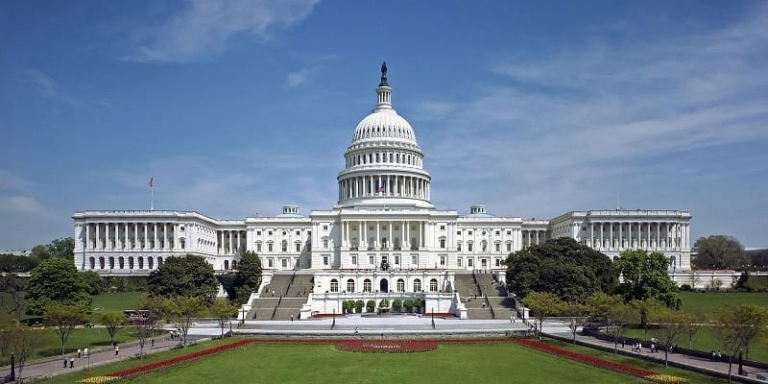
I. Legislative Branch
1) Legislation
House Votes to Condemn Baha’i Persecution in Iran. On December 1, the House of Representatives voted 401-18 to pass H.Res. 744, a resolution condemning the persecution of the Baha’i religious minority in Iran. The resolution calls on the Iranian government to release Baha’is who are being imprisoned or detained solely because of their religion, to end hateful propaganda campaigns against the Baha’i community, and to stop denying Baha’is equal access to higher education, due process under law, and religious freedom. The bill also urges President Biden and Secretary of State Antony Blinken to denounce persecution and to apply sanctions to human rights offenders.
Senators Cotton and Sullivan Introduce Bill to Extend 9/11 Funding to Beirut Bombing Victims. On November 30, Senators Tom Cotton (R-Arkansas) and Dan Sullivan (R-Alaska) introduced S.5156, a bill to expand H.R. 8987, the Fairness for 9/11 Families Act, to extend coverage to victims of the 1983 Beirut Marine Barracks bombing. If passed and signed into law, the bill would aim to improve H.R. 8987 and use $3 billion in unspent CARES Act funds to compensate victims and their families. In November, seven retired four-star Marine Corps generals sent a letter to Senate leadership calling for the amendment of H.R. 8987 to redirect funds for the families and victims of the Beirut attack.
2) Personnel and Correspondence
House Democrats Express Need for a New President During Visit to Lebanon. On November 28, Representatives Mark Takano (D-California), Katie Porter (D-California), and Colin Allred (D-Texas) traveled to Lebanon, urging political leaders to elect a new president amid the country’s economic and political crisis. Alongside US Ambassador to Lebanon Dorothy Shea, the group met with caretaker Prime Minister Najib Mikati, caretaker Foreign Affairs Minister Abdallah Bou Habib, and Speaker of Parliament Nabih Berri. The US delegation congratulated the Lebanese officials on the country’s recent maritime deal with Israel and advised them to pass economic recovery reforms that have been recommended by the International Monetary Fund. The US lawmakers also urged Lebanese officials to facilitate elections and to form a new government to end Lebanon’s current power vacuum.
Senator Risch Discusses Iran at Halifax International Security Forum. Senator Jim Risch (R-Idaho), ranking member of the Senate Committee on Foreign Relations, led a bipartisan congressional delegation to the 2022 Halifax International Security Forum, where he discussed US policy toward Iran and the rise of autocracy across the globe. In a moderated panel, Risch denounced Iran’s violent crackdowns on peaceful protesters and called for the United States to “walk away” from nuclear negotiations and to increase sanctions on the Iranian government.
Representative Jeffries to Assume Democratic House Leadership Role with Israel Lobby’s Support. On November 30, House Democrats elected Representative Hakeem Jeffries (D-New York) as the incoming minority leader of the House of Representatives, where he will replace Speaker of the House Nancy Pelosi (D-California), who is stepping down from her post. Before Jeffries’ election, former House Representative Robert Wexler (D-Florida) praised the news of Jeffries’ potential leadership, stating, “If the pro-Israel community wanted to create a Democratic leader for the future, we would create Hakeem Jeffries.” Jeffries has previously opposed legislation to condition military aid to Israel and has rejected human rights reports labeling Israel an apartheid state. A pro-Israel lobbying group, Pro-Israel America, was the largest donor to Jeffries’ congressional campaign in 2021–2022.
Senate Democrats Discuss US-Israel Relationship with American Jewish Groups. On November 30, Senator Amy Klobuchar (D-Minnesota) led a meeting between twenty US-based Jewish organizations and two dozen Senate Democrats to discuss the US-Israel relationship and the Jewish community in the United States. During the meeting, several attendees expressed their concern about the US government potentially working with newly appointed far-right Israeli politicians in Benjamin Netanyahu’s incoming government. On foreign policy, lawmakers offered their support for passing a National Defense Authorization Act before the end of the current Congress, while the American Jewish Committee encouraged increased efforts toward Arab-Israeli normalization.
Representative Allred Calls for US Support for SDF in Syria. On December 3, Representative Colin Allred (D-Texas) responded to Syrian Democratic Forces (SDF) General Mazloum Abdi’s op-ed in the Washington Post calling for international support against a potential Turkish invasion of Syria. Representative Allred said that while Turkey has the right to defend itself, the United States cannot turn its back on the Kurdish people in Syria and Iraq.
House Foreign Affairs Committee Leadership Expresses Concern over Turkish Attacks in Syria. On December 3, House Foreign Affairs Committee Chairman Gregory Meeks (D-New York) and Ranking Member Michael McCaul (R-Texas) released a statement expressing concern about Turkey’s recent attacks on the US-supported Syrian Democratic Forces (SDF) in Syria. The representatives urged Turkish President Recep Tayyip Erdoğan to refrain from actions that would undermine the Global Coalition to Defeat ISIS, which includes the SDF.
II. Executive Branch
1) The White House
Former US Ambassador to Israel and Arab-Israeli Peace Negotiator Pressure Biden over Far-Right Israeli Government. On November 29, former State Department Senior Advisor on Arab-Israeli negotiations Aaron David Miller and former US Ambassador to Israel Daniel C. Kurtzer published an op-ed in the Washington Post calling on President Biden to “respond boldly” to the upcoming inauguration of far-right Israeli officials Itamar Ben-Gvir, Bezalel Smotrich, and Avi Maoz. The former officials warned against increased settlement activity, settler violence, and terrorism in the West Bank and Jerusalem. They also called on the Biden administration to withdraw military assistance to Israel that could be used in Jerusalem or the occupied territories, and urged that the administration avoid working with Israel’s far-right ministers.
President Biden Discusses Iran, Lebanon, Islamic State, and Abraham Accords with French President. On December 1, the White House released a joint US-France statement upon the occasion of French President Emmanuel Macron’s first state visit to the White House. During the visit, Macron and President Biden discussed the Negev Forum, the Abraham Accords, the Israel-Lebanon Maritime Agreement, and the urgent need for Lebanon to elect a new president. The two leaders also discussed efforts to defeat the so-called Islamic State (IS), the humanitarian situation in Syria, Iranian protests, drone proliferation, and nuclear activities.
Director of National Intelligence Haines Says Protests Are Not an Imminent Threat to Iranian Government. On December 3, Director of National Intelligence Avril Haines said in an interview that the Iranian government does not see the current protest movement as an “imminent threat to the regime.” Haines noted that rising inflation and economic uncertainty in Iran could change this assessment.
2) Department of State
Special Envoy to Iran Casts Doubt on Return to JCPOA. On November 30, Special Envoy for Iran Robert Malley discussed stalled negotiations on a renewed nuclear deal with Iran in an interview with Foreign Policy. Malley expressed that a return to the JCPOA is no longer on the Biden administration’s agenda due to Iran’s destabilizing activities, particularly its suppression of protests and its provision of drones to Russia for use in its war in Ukraine. Malley also discussed the incoming Israeli government, stating that the United States will continue to have “very close conversations” with Israeli Prime Minister-elect Benjamin Netanyahu’s government, despite concerns over the appointment of far-right ministers.
Special Representative for Palestinian Affairs Amr Confirms Jerusalem Consulate Plans. On November 30, Special Representative for Palestinian Affairs Hady Amr reaffirmed that the United States is committed to reopening the US Consulate for Palestinians in Jerusalem, which President Biden pledged to reopen during his 2020 presidential campaign. In affirming the United States’ support for the matter, Amr said, “We continue to believe that re-opening the Consulate would put the United States in the best position to engage with and provide support to the Palestinian people.”
US Citizen Arrested in the UAE Faces Extradition to Egypt. Sherif Osman, an Egyptian American who was arrested in Dubai on November 6, reportedly faces the possibility of extradition to Egypt over his criticism of Egyptian President Abdel Fattah el-Sisi and his call for protests at the COP27 climate conference in Sharm el-Sheikh. An Emirati official said that Osman was originally arrested upon the request of an Arab League body that coordinates member states’ law enforcement and national security. Staff from the US Embassy in the UAE spoke with Osman on November 10.
US Citizen Arrested in Iraq Released from Prison. On December 1, Iraq’s Supreme Judicial Council confirmed that an American citizen had been released from prison after being arrested in Erbil in August at the request of federal authorities in Baghdad. The citizen, identified only as SF Shaker, was arrested on charges of spying and was targeted by Iran-backed militias in Iraq. The State Department reportedly engaged in negotiations with the Iraqi government for his release.
Secretary Leaf Meets with Iranian Activist. On December 1, Assistant Secretary of State for Near Eastern Affairs Barbara Leaf met with Shohreh Bayat, an Iranian chess arbiter who was awarded a State Department International Women of Courage Award in 2021 for her activism and bravery in the face of threats from the Iranian government. In her meeting with Bayat, Leaf emphasized the United States’ commitment to freedom of speech and expression for the Iranian people.
State Department Dedicates New Consulate General in Dhahran, Saudi Arabia. On November 29, State Department officials dedicated a new Consulate General campus in Dhahran, Saudi Arabia. It is one of two US Consulate Generals in Saudi Arabia, with the other located in Jeddah.
Religious Freedom Ambassador Hussain Travels to Morocco. On November 28, US Ambassador at Large for International Religious Freedom Rashad Hussain traveled to Morocco to meet with government officials and civil society leaders.
Secretary Blinken Discusses US-Israel Ties, New Israeli Government at Conference. On December 4, Secretary of State Antony Blinken spoke at the J Street National Conference in Washington, offering remarks on the US-Israel relationship. During his address, Blinken reaffirmed the Biden administration’s support for Israel, its commitment to a two-state solution, and its opposition to settlement expansion, annexation, and eviction, which threaten the two-state solution. On the incoming Israeli government, Blinken said that the United States will judge far-right ministers on policy over personality, reaffirming that the United States will work with the new Israeli government. On Iran, Blinken said that despite popular protests and drone proliferation, the United States is seeking a diplomatic solution to Iran’s nuclear program, vowing to consult Israel and other allies on the topic, but warning that military solutions remain on the table if diplomacy fails.
State Department Designates Saudi Arabia and Iran as Religious Freedom Violators. On December 2, Secretary of State Antony Blinken released the State Department’s religious freedom designations, which cite Saudi Arabia and Iran, among other nations, as countries of particular concern under the International Religious Freedom Act of 1998. The statement says that the United States will regularly engage with designated actors to improve freedom of religion in their countries.
State Department Releases Multinational Joint Statement on Sudanese Agreement. On December 5, the State Department released a joint statement with members of the Quad and Troika (Norway, Saudi Arabia, the United Arab Emirates, and the United Kingdom) welcoming an initial political framework in Sudan, calling it an “essential first step toward establishing a civilian-led government and defining constitutional arrangements to guide Sudan through a transitional period culminating in elections.” Earlier that day, Sudanese military and political leaders signed a preliminary deal to create a two-year civilian-led transition from military rule following the military’s October 2021 coup. The multinational group encouraged all Sudanese actors to engage in political dialogue and praised the military’s constructive engagement.
3) Department of Defense
Pentagon Expresses Concern about Potential Turkish Ground Invasion in Syria. On November 30, Pentagon Press Secretary Pat Ryder expressed the United States’ concern about the threat of a Turkish ground operation against the US-supported Syrian Democratic Forces. The State Department has also confirmed that US civilian staff and diplomats in the Kurdish region of Syria have been evacuated to Erbil, the capital of the autonomous Kurdistan Region in Iraq, due to the possibility of a Turkish attack. On November 30, Secretary of Defense Lloyd J. Austin III met with Turkish Minister of National Defense Hulusi Akar, expressing the DoD’s “strong opposition” to Turkey’s new military operation in Syria. On December 2, the US-led coalition reportedly resumed its regular patrols of the northeastern region of Syria.
Syrian Democratic Forces Halt Anti-Islamic State Operations with US Military. On December 2, a spokesperson for the Syrian Democratic Forces (SDF) announced that the US-supported militia will end “all coordination and joint counter-terrorism operations” with the US-led coalition to defeat the so-called Islamic State (IS). Earlier in the week, SDF Commander Mazloum Abdi called for increased US intervention against a potential Turkish invasion. Abdi said that SDF preparation for the invasion has coincided with an uptick in activity from IS cells, and warned that a Turkish ground invasion could occur within a week if the United States or Russia do not intervene.
CENTCOM Confirms Death of Islamic State Leader. On November 30, CENTCOM spokesperson Colonel Joe Buccino confirmed the death of Abu al-Hassan al-Hashimi al-Qurayshi, a leader of the so-called Islamic State. Buccino stated that the leader was killed in mid-October in Syria’s Daraa Province in an operation conducted by the Free Syrian Army.
DoD Announces $1 Billion Weapons Sale to Qatar. On November 29, the Department of Defense announced that it has received State Department approval for a potential $1 billion dollar weapons sale to Qatar, consisting of Small Unmanned Aircraft Integrated Defeat Systems. Qatar also requested a purchase of four MQ-9B predator drones, but the US government has not yet responded to the request. Qatar, which is home to Al-Udeid Air Base and the forward operating headquarters of the US Central Command, was designated a major non-NATO ally in January, which gave its government preferential access to US military equipment and training collaboration. The potential weapons sale was reported to Congress, as required by law.
US Air Force Begins Joint Drills with Israeli Military. On November 29, the US Air Force began joint aerial drills with the Israeli Defense Forces (IDF) to simulate attacks against Iran and its proxies. The drills took place over Israel and the Mediterranean Sea and were agreed upon last week during a visit by IDF Chief of General Staff Aviv Kohavi’s to the United States. Upon returning to Israel, Kohavi announced that collaboration between the US military and the IDF will be “significantly expanded” to address regional challenges.
US Navy Intercepts 50 Tons of Military Hardware in Gulf of Oman. On December 1, the US Navy intercepted a fishing trawler in the Gulf of Oman carrying over 50 tons of ammunition rounds, fuses, and propellants for rockets. The trawler was discovered along a common route from Iran to Yemen and is believed to have been delivering the equipment to the Houthis.
4) Department of the Treasury
Treasury Department Sanctions Hezbollah Financial Facilitators. On December 1, the Treasury Department’s Office of Foreign Assets Control (OFAC) announced sanctions on two individuals and two companies in Lebanon for providing financial support and weapons procurement for Hezbollah. The companies include Al-Khobara for Accounting, Auditing, and Studies and Auditors for Accounting and Auditing, both of which have ties to Hezbollah’s Central Finance Unit and Al-Qard Al-Hassan, Hezbollah’s quasi-financial institution. According to OFAC, these actions underscore Hezbollah’s continued presence in Lebanon as the country grapples with an economic and political crisis.
5) Department of Justice
Department of Justice Indicts Alabama Man for Violating US Sanctions Against Iran. On November 29, the Department of Justice charged Ray Hunt of Alabama with federal offenses related to the smuggling of goods in violation of US sanctions on Iran. According to the department, Hunt has exported US-origin parts to Iran for use in the oil and gas industry using his Alabama-based company, Vega Tools LLC. Hunt shipped goods through Turkey and the United Arab Emirates to avoid US sanctions.
III. Judicial Branch
Trial Begins for Alleged Islamic State Recruiter in New York. On November 28, the trial of Abdullah el-Faisal, a Muslim preacher facing charges for his support of the so-called Islamic State (IS), began in the New York State Supreme Court. Faisal is standing trial for allegedly attempting to recruit for IS. In 2016, Faisal communicated with an undercover New York City police officer on numerous online platforms, where he encouraged her to carry out terror attacks overseas and offered to help her join IS.


